
Nigerian-Israeli Group Pushes to Include Nigeria in “Abraham Accords” as Part of Israel’s Apartheid Normalisation Drive

Israeli Lobby Targets Nigeria Through FramanAgridev’s Covert Dealings
The normalisation of Israel’s apartheid regime is stretching beyond the Middle East and North Africa, and Nigeria may be its next target. Through a Nigerian-Israeli venture, Emeka Francis Mba has discreetly enlisted Jack Pascal Barcroft, a former Republican Party Chairman in Texas, with a $20,000 retainer to lobby U.S. policymakers for Nigeria’s inclusion in the Abraham Accords.
On June 2, 2025, Mba registered as a foreign agent under the U.S. Foreign Agents Registration Act (FARA). This 87-year-old law is designed to prevent covert foreign influence on U.S. policy and public opinion. To avoid penalties of up to five years in prison or a $10,000 fine per violation, Mba complied by disclosing his political lobbying efforts, signing the FARA documents as legally required.
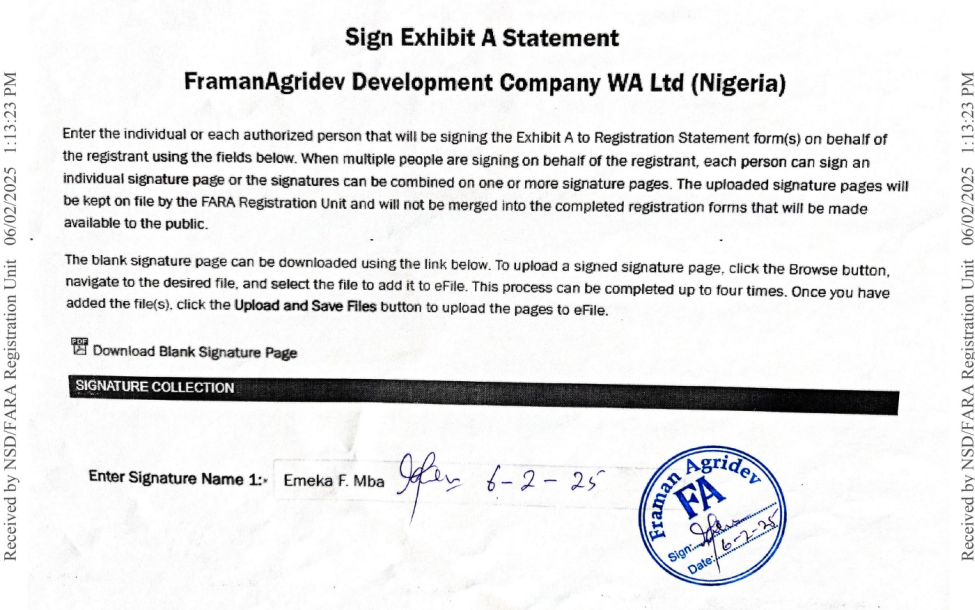
Who Is Emeka Mba?
Mba serves as the director of Framan Enterprises Nigeria Limited and Framan Investments Ltd. He helped establish FramanAgridev Development Enterprise W/A Limited in partnership with Israeli-owned Agridev (Agricultural Development Company (Int) Limited).

Their collaboration gave rise to the “Desert-to-Food” program in 2009, leveraging connections with the U.S.-Israeli Foreign Mission’s Office in Lagos. By June 2025, this partnership evolved into a lobbying vehicle involving Israeli partners Orgad Eli and Orgard Yuval.

FARA filings further reveal that FramanAgridev engaged FramanSortie Consultancy Ltd., owned by Neil Smith, to support these efforts. Barcroft’s role as a political liaison includes lobbying to promote and normalise diplomatic ties between Nigeria, Israel, and the U.S.
According to the FARA documents, Barcroft is tasked with diplomatic outreach, briefing preparation, negotiation strategy advice, and communication with U.S. officials, all for a non-refundable fee of $20,000. The ultimate aim is to secure Nigeria’s inclusion in the Abraham Accords through an “Extension Arrangement.”


Why Nigeria?
While geographically distant from the Arab world, Nigeria’s cultural and economic ties, particularly in oil and Northern Islam, make it an attractive candidate. Nigeria is also a member of the Organisation of Islamic Cooperation (OIC), despite not being a Muslim-majority country. This provides an opening for Israeli strategists to push for its inclusion as part of an effort to reframe normalisation on broader African terms.
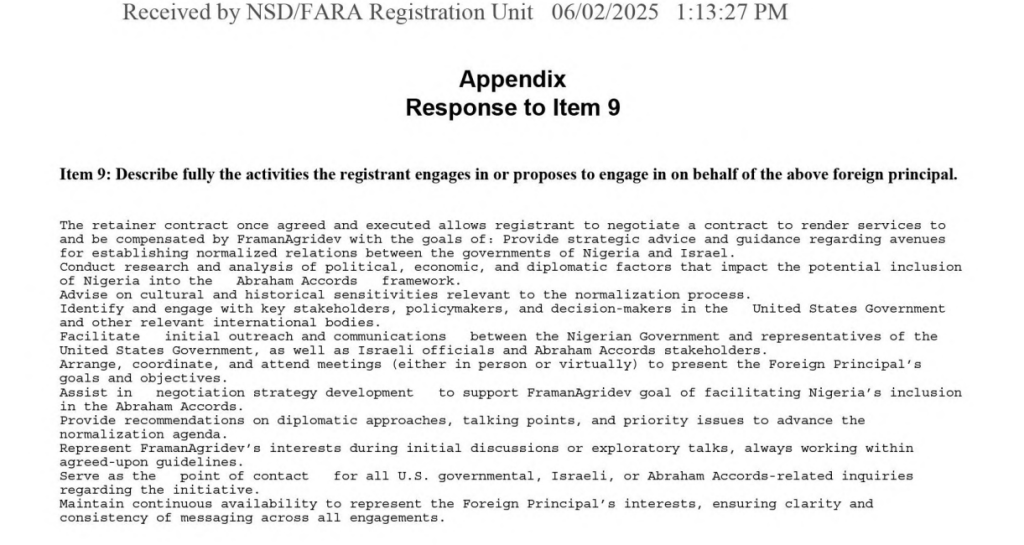
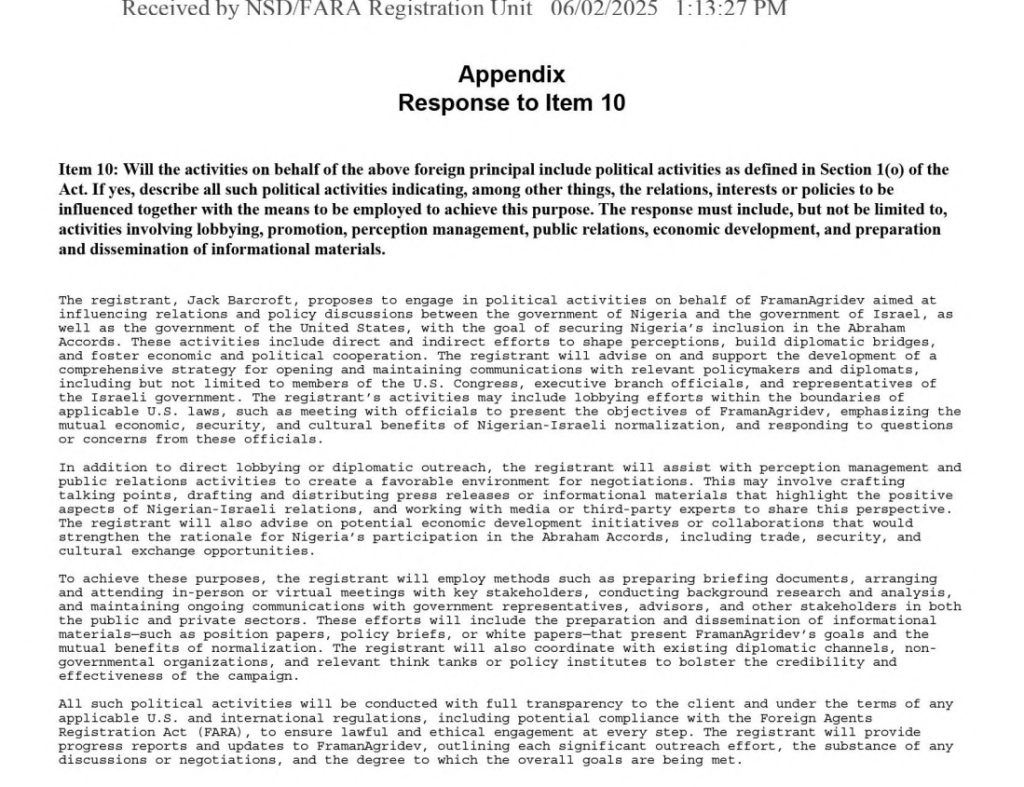
Abraham Accords: A Peace Deal or Power Play?
Initially brokered by the Trump administration in September 2020, the Abraham Accords were touted as a peace initiative to normalise relations between Israel and the UAE, Bahrain, Morocco, and (partially) Sudan. Western and Israeli leaders celebrated the deal, with media and social influencers echoing its promise of regional harmony.
But the reality is more complex and controversial.
Israel’s Prime Minister Benjamin Netanyahu and former Defence Minister Yoav Gallant, both under ICC arrest warrants for alleged war crimes in Gaza, championed the Accords. Netanyahu even nominated Donald Trump for the 2025 Nobel Peace Prize for his role in the deal, following Trump’s proposal to transform Gaza into a luxury resort, which is a euphemism for ethnic cleansing.
Jared Kushner, Trump’s son-in-law and senior advisor, was also instrumental. He later founded the Abraham Accords Peace Institute (AAPI) and, in 2024, publicly speculated on the real estate potential in Gaza, calling its waterfront “very valuable”—a statement many viewed as a thinly veiled endorsement of forced displacement.
Despite Netanyahu’s claim that the Accords represent peace “between peoples,” the initiative has largely ignored Palestinian statehood and displacement. Instead, the deals have centred on military, surveillance, and financial alliances between Israel and its new Arab allies, aligning against Iran and sidelining Palestine.
Trump envoy Adam Boehler confirmed this in 2024:
The whole point of the Abraham Accords is to unite the Middle East with our allies against Iran.
What’s at Stake for Nigeria?
As a founding member of the Non-Aligned Movement (NAM), Nigeria has historically avoided aligning with major power blocs. Its official position supports a two-state solution in Israel and Palestine. Foreign Minister Yusuf Tuggar has condemned the violence in Gaza, saying there is “no justification for carnage,” and also criticised Israel’s attack on Iran as unprovoked.
Mba’s lobbying risks compromising this stance. If successful, it could push Nigeria into the orbit of U.S.-Israeli geopolitical strategy, despite prior commitments to neutrality. The consequences could be grave, as evidenced by the regional fallout following the U.S. invasion of Libya in 2011, which flooded the Sahel with armed groups and destabilised Northern Nigeria.
The U.S. Department of Homeland Security has even warned that the Abraham Accords could incite violence and terrorism, particularly as they’re increasingly seen as a framework for proxy warfare rather than peace.
Enticements and Consequences
The Abraham Accords offer signatory states incentives, but often with strings attached.
-
Morocco received 150 Israeli drone systems in 2022 and U.S. recognition of its sovereignty over Western Sahara.
-
Bahrain secured a bilateral security pact.
-
The UAE gained visa-free travel with Israel and lucrative trade agreements.
These “rewards” mask a deeper cost: entrenching Israel’s influence and coercing nations into a de facto anti-Iran alliance. For example, UAE, Morocco, and Bahrain now face pressure to join what Israeli officials have called the “Abraham Alliance”, a regional security bloc geared toward countering Iran.
This shift was crystallised when Israel launched an unprovoked attack on Iran’s nuclear program, despite its openness to IAEA supervision. Should Nigeria join the Accords, it risks being drawn into these confrontations and abandoning its neutral foreign policy for a dangerous alliance.
Urgent Questions for Nigeria’s Leaders
Before Nigeria is pulled into this expanding geopolitical web, its leaders must ask:
From a security standpoint:
-
What protections exist against covert foreign operations tied to Israel within Nigerian borders?
-
How was Mba able to employ a U.S. citizen to lobby American officials on behalf of Israeli-linked interests?
From a legislative standpoint:
-
What laws govern foreign-linked businesses that use Nigerian entities as lobbying fronts abroad?
-
Why hasn’t Nigeria established a FARA-style framework to monitor foreign influence and lobbying?
As lobbying intensifies to draw Nigeria into the Abraham Accords, the nation must tread carefully. Short-term gains in trade or technology cannot justify sacrificing neutrality, sovereignty, or national security.
If history teaches anything, from Libya’s collapse to the rise of proxy wars in the Sahel, it’s that geopolitical entanglements rarely come without bloodshed.
Read More:
- Tinubu’s Coastal Highway Project Faces Scrutiny as Senate Approves $700 Million Loan with Just 30km Completed
- US and Israel Turn Africa Into a Dumping Ground for Deportees and Displaced Palestinians
About The Author
Mayowa Durosinmi
author
M. Durosinmi is a West Africa Weekly investigative reporter covering Politics, Human Rights, Health, and Security in West Africa and the Sahel Region
Mayowa Durosinmi
M. Durosinmi is a West Africa Weekly investigative reporter covering Politics, Human Rights, Health, and Security in West Africa and the Sahel Region
Related Articles
AES Condemns Niamey Airport Attack, Warns of Coordinated Destabilisation
The Alliance of Sahel States has strongly condemned the armed attack on...
ByWest Africa WeeklyFebruary 2, 2026Mali Cedes Strategic Land to Guinea to Deepen Trade Cooperation
Mali has approved the transfer of a strategic parcel of land to...
ByWest Africa WeeklyFebruary 2, 2026Senegal to Appeal CAF Sanctions After AFCON Final Controversy
Senegal has announced plans to formally appeal the sanctions imposed by the...
ByWest Africa WeeklyFebruary 2, 2026Burkina Faso Takes Legal Step Toward Nuclear Energy Development
Burkina Faso has voted to join the Vienna Convention on Civil Liability...
ByWest Africa WeeklyFebruary 2, 2026






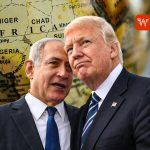
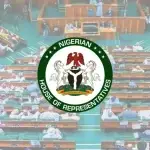




Leave a comment